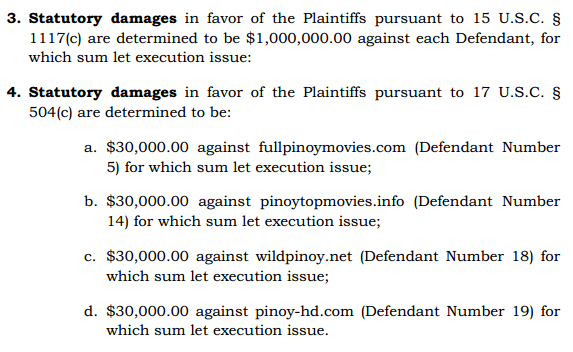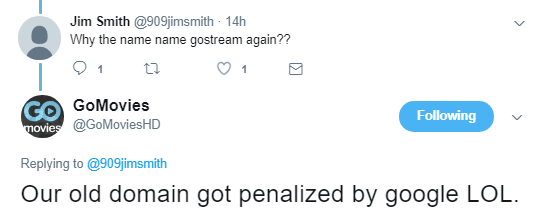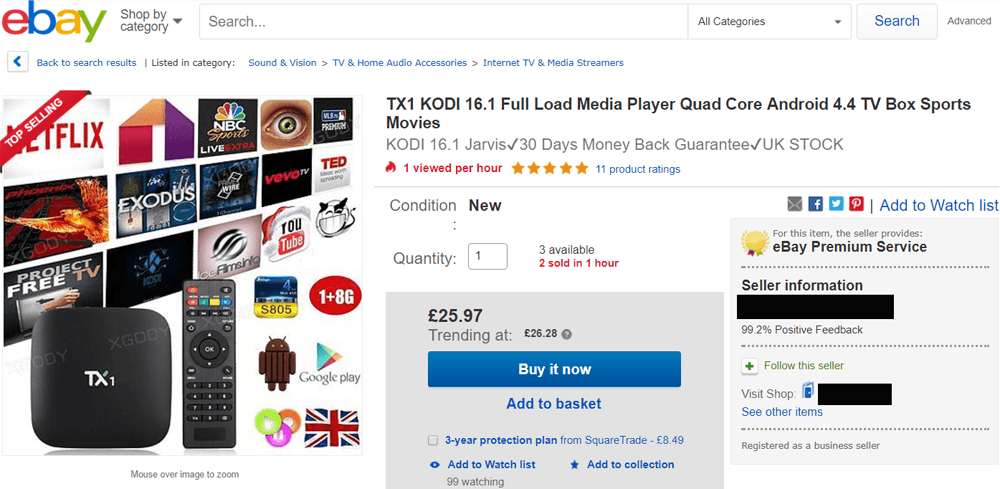LibreELEC USB-SD Creator v1.3 is released with support for Brazilian Portuguese and Chinese localisations and minor improvements to existing translations. It also adds audible feedback on completion of image download and image writing, and corrects visual sorting for releases with x.x.x.x numbering. The Asturian localisation has been tweaked to show an Asturian (not Spanish) flag icon. If you would like to see a localisation added in a future release please visit the LibreELEC team page on Transifex to request it and contribute the translated text strings. Requesting a new localisation does not automatically translate it! NB: Transifex currently shows missing and incomplete...
Source link

As a result, large sums of money are expended every day in an effort to keep unlawful distribution under control. Over the years there have been many strategies and several of these have involved targeting end users.
The world is a very big place and the tackling of piracy differs from region to region, but what most consumers of unauthorized media want to know is whether they’re putting themselves at risk.
The short answer is that no matter where people are, there is always some level of risk attached to obtaining and using pirate content. The long answer is more nuanced.
BitTorrent and other P2P protocols
By its very nature, using BitTorrent to access copyrighted content comes with a risk. Since downloaders are also distributors and their IP addresses are necessarily public, torrent users are extremely easy to track. In fact, with a minimum of equipment, any determined rightsholder is able spot and potentially uncover the identity of a file-sharer.
But while basic BitTorrent sharing gets a 0/10 for privacy, that’s a bit like saying that a speeding car gets 0/10 for stealth. Like the speeding car, anyone can see the pirating torrent user, but the big question is whether there’s anyone around who intends to do anything about it.
The big surprise in 2017 is that users are still statistically unlikely to face any consequences.
In the United States, for example, where copyright trolling can be a serious issue for those who get caught up in the net, the problem still only affects a tiny, tiny proportion of pirates. A one percent risk of getting snared would be overstating the risk but these are still odds that any gambler would be happy to take.
Surprisingly, pirates are also less likely to encounter a simple friendly warning than they were last year too. The “Six Strikes” Copyright Alerts System operated by the MPAA and RIAA, that set out to advise large volumes of pirates using notices sent via their ISPs, was discontinued in January. Those behind it gave in, for reasons unknown.
This means that millions of torrent users – despite exposing their IP addresses in public while sharing copyrighted content – are doing so without significant problems. Nevertheless, large numbers are also taking precautions, by using anonymization technologies including VPNs.
That’s not to say that their actions are legal – they’re not – but outside the few thousand people caught up in trolls’ nets each year, the vast and overwhelming majority of torrent users (which number well over 100 million) are pirating with impunity.
In the UK, not even trolling is a problem anymore. After a few flurries that seemed to drag on longer than they should, copyright trolls appear to have left the country for more lucrative shores. No cases have gone through the courts in recent times which means that UK users are torrenting pretty much whatever they like, with no legal problems whatsoever.
It’s important to note though, that their actions aren’t going unnoticed. Unlike the United States, the UK has a warning system in place. This means that a few thousand customers of a handful of ISPs are receiving notices each month informing them that their piratey behavior has been monitored by an entertainment company.
Currently, however, there are no punishments for those who are ‘caught’, even when they’re accused of pirating on a number of occasions. At least so far, it seems that the plan is to worry pirates into submission and in some cases that will probably work. Nevertheless, things can easily change when records are being kept on this scale.
Germany aside (which is overrun with copyright trolling activity), a handful of other European countries have also endured relatively small troll problems (Finland, Sweden, Denmark) but overall, file-sharers go about their business as usual across the continent. There are no big projects in any country aiming to punish large numbers of BitTorrent users and only France has an active warning notice program.
Canada and Australia have also had relatively small problems with copyright trolls (the former also has a fairly toothless ISP warning system) but neither country is considered a particularly ‘dangerous’ place to share files using BitTorrent. Like the United States, UK, and Europe, the chances of getting prosecuted for infringement are very small indeed.
Why such little enforcement?
There are a number of reasons for the apparent lack of interest in BitTorrent users but a few bubble up to the top. Firstly, there’s the question of resources required to tackle millions of users. Obviously, some scare tactics could be deployed by hitting a few people hard, but it feels like most companies have moved beyond that thinking.
That’s partly due to the more recent tendency of entertainment groups and governments to take a broader view of infringement, hitting it at its source by strangling funds to pirate sites, hitting their advertisers, blocking their websites, and attempting to forge voluntary anti-piracy schemes with search engines.
It’s also worth noting that huge numbers of people are routinely protecting themselves with VPN-like technology, which allows them to move around the Internet with much improved levels of privacy. Just recently, anti-piracy outfit Rightscorp partly blamed this for falling revenues.
Importantly, however, the nature of infringement has been changing for some time too.
A few years ago, most people were getting their movies and music from torrent sites but now they’re more likely to be obtaining their fix from a streaming source. Accessing the top blockbusters via a streaming site (perhaps via Kodi) is for the most part untraceable, as is grabbing music from one of the hundreds of MP3 portals around today.
But as recent news revealed, why bother with ‘pirate’ sites when people can simply rip music from sites like YouTube?
So-called stream-ripping is now blamed for huge swathes of piracy and as a result, torrent sites get far fewer mentions from anti-piracy groups than they did before.
While still a thorn in their side, it wouldn’t be a stretch to presume that torrent sites are no longer considered the primary problem they once were, at least in respect of music. Now, the ‘Value Gap‘ is more of a headache.
So, in a nutshell, the millions of people obtaining and sharing copyrighted content using BitTorrent are still taking some risks in every major country, and those need to be carefully weighed.
The activity is illegal almost everywhere, punishable in both civil and criminal courts, and has the potential to land people with big fines and even a jail sentence, if the scale of sharing is big enough.
In truth, however, the chances of the man in the street getting caught are so slim that many people don’t give the risks a second thought. That said, even people who drive 10mph over the limit get caught once in a while, so those that want to keep a clean sheet online often get a VPN and reduce the risks to almost 0%.
For people who stream, life is much less complicated. Streaming movies, TV shows or music from an illicit source is untraceable by any regular means, which up to now has made it almost 100% safe. Notably, there hasn’t been a single prosecution of a user who streamed infringing content anywhere in the world. In the EU it is illegal though, so something might happen in future, potentially…..possibly…..at some point….maybe.
And here’s the thing. While this is the general position today, the ‘market’ is volatile and has the ability to change quickly. A case could get filed in the US or UK next week, each targeting 50,000 BitTorrent users for downloading something that came out months ago. Nobody knows for sure so perhaps the best analogy is the one drummed into kids during high-school sex education classes.
People shouldn’t put themselves at risk at all but if they really must, they should take precautions. If they don’t, they could easily be the unlucky one and that is nearly always miserable.
Source: TF, for the latest info on copyright, file-sharing, torrent sites and ANONYMOUS VPN services.

This week a federal court in Florida signed a default judgment against 19 websites that offered links to copyright infringing streams of ABS-CBN owned movies.
The lawsuit in question was filed in April and targets cinesilip.net, pinoychannel.co, pinoy-hd.com, and several other streaming portals that specialize in Philippine content. These sites also attract visitors from other countries, including the United States, where they target people of Philippine origin.
“Defendants’ entire Internet-based website businesses amount to nothing more than illegal operations established and operated in order to infringe the intellectual property rights of ABS-CBN and others,” the company wrote in its original complaint.
Despite facing hefty damages, none of the defendants turned up in court. This prompted ABS-CBN to file for a default judgment which was granted this week.
In his verdict, US District Judge Robert Scola Jr orders the 19 websites to pay $1 million in damages each. These damages are not for copyright infringement, as one would expect, but for violating ABS-CBN’s trademark. In addition, four of the defendants received an additional $30,000 in copyright infringement damages on top.
The media giant initially suggested that it would request the maximum of $2 million in trademark infringement damages per site, but has opted go “only” for half.
Part of the order
ABS-CBN’s most recent win follows a pattern of similar verdicts in recent months. The company has managed to score dozens of millions in damages from a wide variety of streaming sites with relative ease.
In addition to the millions of dollars that were awarded, Judge Scola also signed off on a permanent injunction to sign over the websites’ domain names to the media giant.
The question remains, of course, whether the company will ever see a penny in return. Most of the defendants remain unknown and even if they’re identified, most won’t have an extra million lying around.
To increase the chance of seeing something of monetary value in return, ABS-CBN also requested an injunction against the advertisers of several pirate sites in its latest lawsuit. If granted, this would allow the company to claim the pending advertising payouts. However, no such injunction was requested in the current case.
—
A copy of the default judgement is available abs-default, and a list of all the defendants is available below.
cinesilip.net
pinoychanneltv.me
pinoytambayantv.me
pinoytambayanreplay.net
drembed.com
embeds.me
fullpinoymovies.com
lambingan.ph
magtvna.com
pinoye.com
pinoyteleserye.org
pinoytvnetwork.net
pinoytopmovies.info
teleserye.me
watchpinaytv.com
wildpinoy.net
pinoy-hd.com
pinoytvreplay.ws
pinoychannel.co
wowpinoytambayan.ws
pinoytelebyuwers.se
Source: TF, for the latest info on copyright, file-sharing, torrent sites and ANONYMOUS VPN services.

The popular movie streaming sites GoMovies, formerly known as 123movies, is one of the most-used streaming sites. While it’s built a steady userbase of millions of users over the past year, the site’s home keeps changing.
The latest move came this week. Going forward, the site will be active from GoStream.is, operating from the Icelandic gostream.is domain name.
While the site hasn’t officially commented on the reason for the move, on Twitter a site representative mentioned a Google ‘penalty’ as the main driver behind the recent change.
Penalized
When we looked at the issue more closely, we found that it’s not so much a penalty, but rather a response to a DMCA takedown request.
Earlier this week the site’s homepage was removed from Google’s search engine following a takedown notice from Warner Bros. This made it harder for users to find the site through Google, as various knockoffs were ranked higher in the search results for the “Gomovies” keyword.
In addition to relocating to a new domain name, the site has also changed the look of its homepage. Instead of a page filled with the most popular movies and TV-shows, it now lists a basic search box.
New GoMovies homepage
The homepage change is likely a response to Google’s search engine removal as well. The previous GoMovies domain was targeted by Warner Bros. because it listed a link to a pirated movie, but such links are no longer present on the new homepage.
That said, users who prefer the old look can still access it with a single click, which is prominently mentioned on the site.
Despite the domain name change, the GoMovies brand hasn’t changed. The logo and all other references to the site’s name remain intact. Confusingly, people who search for GoMovies on Google still won’t see the Gostream.is URL in the top results, but perhaps that will change in the future.
Source: TF, for the latest info on copyright, file-sharing, torrent sites and ANONYMOUS VPN services.

Earlier this year the Swede (who is of both Norwegian and Finnish ancestry) sold his second most famous project Flattr to the parent company of Adblock Plus. Now, however, he has another digital baby to nurture, and this one is quite interesting.
Like many countries, Sweden operates a public early warning system. Popularly known as ‘Hesa Fredrik’, it consists of extremely loud outdoor sirens accompanied by radio and television messages.
The sirens can be activated in specific areas of the country wherever the problems exist. Fire, floods, gas leaks, threats to the water system, terrorist attacks or even war could trigger the alarm.
Just recently the ‘Hesa Fredrik’ alarm was sounded in Sweden, yet there was no planned test and no emergency. The public didn’t know that though and as people struggled to find information, authority websites crashed under the strain. The earliest news report indicating that it was a false alarm appeared behind a news site’s paywall. The national police site published no information.
The false alarm[youtube https://www.youtube.com/watch?v=DbIGhZGn0bQ&w=560&h=315]
Although Sunde heard the sirens, it was an earlier incident that motivated him to find a better solution. Speaking with Swedish site Breakit, Sunde says he got the idea during the Västmanland wildfire, which burned for six weeks straight in 2014 and became the largest fire in Sweden for 40 years.
“I got the idea during Västmanland fire. It took several days before text messages were sent to everyone in the area but by then it was already out of control. I thought that was so very bad when it is so easy to build something better,” Sunde said.
Sunde’s solution is the Hesa Fredrika app, which is currently under development by himself and several former members of the Flattr team.
“The goal is for everyone to download the app and then forget about it,” Sunde says.
When one thinks about the problem Sunde is trying to solve (i.e. the lack of decent and timely information in a crisis) today’s mobile phones provide the perfect solution. Not only do most people have one (or are near someone who does), they provide the perfect platform to deliver immediately deliver emergency services advice to people in a precise location.
“It is not enough for a small text to appear in the corner of the screen. I want to build something that makes the phone vibrate and sound so that you notice it properly,” Sunde told Breakit.
But while such an app could genuinely save lives in the event of a frankly rare event, Sunde has bigger ideas for the software that could extend its usefulness significantly.
Users will also be invited to add information about themselves, such as their doctor’s name or if they are a blood donor. The app user could then be messaged if there was an urgent need for a particular match. But while the app will be rolled out soon, it won’t be rushed.
“Since it is extremely important to the quality of the messages, we want as many partnerships as possible before we launch something,” Sunde says, adding that in true Pirate Bay style, it will be completely free for everyone.
“So it will remain forever,” he says. “My philosophy is such that I do not want people to pay for things that can save their lives.”
Source: TF, for the latest info on copyright, file-sharing, torrent sites and ANONYMOUS VPN services.

These so-called “copyright trolling” efforts have been a common occurrence in the United States for more than half a decade, and still are.
Malibu Media, the Los Angeles-based company behind the ‘X-Art’ adult movies, is behind many of these cases. The company has filed thousands of lawsuits in recent years, targeting Internet subscribers whose accounts were allegedly used to share Malibu’s films via BitTorrent.
When the accused pirates don’t want to settle, Malibu generally ramps up the pressure. This is also what happened to Jenna Howard, a 29-year-old consultant from Houston, Texas.
When Howard protested her innocence and refused to pay the proposed settlement for downloading 15 pirated videos, the adult company came back with two spreadsheets of additional downloads that were linked to her IP-address.
This tactic isn’t new. Copyright trolls regularly provide lists of other downloads, of content they don’t own, to show that the defendant is a prolific downloader. However, in this case, the list is unusually long.
The spreadsheets provided by Malibu Media suggest that Ms. Howard’s connection was used to download fifty-four thousand torrents in recent years.
The downloads in question are all over the map, literally, with titles ranging from “100MB Woman Ass Pictures,” through “этот неловкий момент,” to “육룡이 나르샤” and “La casa di Topolino.”
A small selection of the alleged downloads
According to a recent filing by Ms. Howard’s attorneys, the spreadsheets are part of Malibu’s intimidation tactics.
“Malibu also produced two spreadsheets that suggest Ms. Howard made over fifty-four thousand downloads consisting of an estimated 27 terabytes of data over a four-year period, which is an average of 31 items every day for the last four years, and literally hundreds of items on certain days, including for example downloads of movies in the hundreds and in languages that Ms. Howard does not even speak.”
“This leads to only two possible conclusions: first, either Ms. Howard’s network was hacked, or second, Malibu’s research is wrong,” Ms. Howard’s attorneys write.
They stress, however, that there is no credible evidence to suggest that their client is responsible for downloading all these files. They point out that their client was even accused of downloading dozens of files from her home connection while she was on her honeymoon.
“The spreadsheets also show that Ms. Howard downloaded 31 items on her wedding day, and somehow managed to download an average of 22 items at her home IP address each day of her international honeymoon when she was overseas in the Bahamas,” the filing reads.
The attorneys believe that the adult company has gone too far and ask the court to deny further discovery requests targeted at her Internet provider AT&T, including information about her download activity.
“Malibu’s shoddy research simply does not support the implication that Ms. Howard illegally downloaded the pornographic movies that are the subject of this suit, as well as an additional 54,000 other, unrelated, downloads,” the attorneys write.
“The supposed overlap between the downloads and Ms. Howard’s interests is also not credible. Malibu peddles smut as a commercial enterprise, and is trying to strong-arm a settlement from Ms. Howard while threatening to link Ms. Howard as a purveyor of its pornographic product.”
Malibu’s efforts are a textbook case of discovery abuse, the defense argues. They hope that the court agrees with this assessment and denies the request.
—
The full request for a protective order is available here (pdf), with help from FCT.
Source: TF, for the latest info on copyright, file-sharing, torrent sites and ANONYMOUS VPN services.

Claiming copyright infringement, Perfect 10 took on a number of giants including Google, Amazon, Mastercard, and Visa, not to mention hosting providers such as LeaseWeb and OVH.
With court papers revealing that Perfect 10 owner Norman Zada worked 365 days a year on litigation and that the company acquired copyrights for use in lawsuits, it’s no surprise that around two dozen of Perfect 10’s lawsuits ended in cash settlements and defaults.
With dollar signs in mind, Perfect 10 went after another pretty big fish in 2011. The publisher claimed that Usenet provider Giganews was responsible when its users uploaded Perfect 10 images to the newsgroups. Things did not go well.
In November 2014, the U.S. District Court for the Central District of California found that Giganews was not liable for the infringing activities of its users. Perfect 10 was ordered to pay Giganews $5.6m in attorney’s fees and costs. Perfect 10 lost again at the Court of Appeals for the Ninth Circuit.
But even with all of these victories under its belt, Giganews just can’t catch a break.
The company is clearly owed millions but Perfect 10 is refusing to pay up. As a result, this week Giganews filed yet another suit, accusing Perfect 10 and Norman Zada of fraud aimed at depriving Giganews of the amounts laid out by the court.
The claims center around an alleged conspiracy in which Perfect 10 transferred its funds and assets to Zada.
“As of now (over two years since the judgment), Perfect 10 has not voluntarily paid any amount of the judgment,” the complaint begins.
“Instead, Perfect 10, through the unlawful acts of Zada and in conspiracy with him, has intentionally avoided satisfaction of the judgment through a series of fraudulent transfers of Perfect 10’s corporate assets to Zada’s personal possession.”
Giganews says these “illegal and fraudulent” transfers began back in 2014, when Perfect 10 began to realize that the fight against the Usenet provider was going bad.
For example, on November 20, 2014, around six days after the court granted summary judgment in favor of Giganews, Perfect 10 transferred $850,000 to Zada’s personal account. The Perfect 10 owner later told a Judgment Debtor’s Examination that the transfer was made due to the summary judgment orders, a statement that amounts to a confession of fraud, Giganews says.
“We had a settlement of $1.1 million in, I believe, June. I was entitled to that money,” Zada told the hearing. “And after the summary judgment orders were issued, I did not see any point in keeping more cash than we needed in the account.”
Giganews says that Perfect 10 transferred at least $1.75m in cash to Zada.
Then, within weeks of the court ordering Perfect 10 to pay $5.6m in attorneys fees and costs, Giganews says that Zada “fraudulently transferred substantially all
of Perfect 10’s physical assets” to himself for an amount that did not represent their true value.
Those assets included a car, furniture, and computer servers. When Zada was questioned why the transfers took place, he admitted that “it would have been
totally disruptive to have those [assets] seized” in satisfaction of the judgment. Indeed, the complaint alleges that the assets never moved physical location.
Perhaps surprisingly given the judgment, Giganews alleges that Zada continues to run Perfect 10’s business in much the same way as he did before. The company even has copyright infringement litigation underway against AOL in Germany, despite having few assets.
This is made possible, Giganews says, by Perfect 10 calling on assets it previously transferred to Zada. When required by the company, Zada simply “gives” them back.
In summary, Giganews says these transfers display the “badges of fraud” that indicate attempts to “hinder, delay or defraud” creditors, while leaving Perfect 10 practically insolvent.
“As a consequence, Plaintiffs are entitled to a judgment against Defendants, and each of them, in the sum of the unlawfully transferred amounts of at least $1,750,000, or in an amount to be proven at trial, together with interest on that amount at the legal rate of 10% per annum from and after March 24, 2015,” the complaint reads.
But the claim doesn’t stop there. Giganews asks the court to prevent Perfect 10 from transferring any more cash or assets out of Perfect 10 to Zada or anyone acting in concert with him or on his behalf. This is rounded off with a claim for punitive and exemplary damages of $20m to be considered during a jury trial.
Source: TF, for the latest info on copyright, file-sharing, torrent sites and ANONYMOUS VPN services.

In this “Battle for the Net,” they are joined by many prominent groups and companies, including Amazon, BitTorrent, Dropbox, Netflix, and even Pornhub.
Under the present net neutrality rules, there’s a clear standard that prevents ISPs from blocking, throttling, and paid prioritization of “lawful” traffic. In addition, they allow Internet providers to be regulated as carriers under Title II.
If the current net neutrality rules disappear, some fear that throttling and ‘fast lanes’ for some services will become commonplace.
Historically, there is a strong link to between net neutrality and online piracy. The throttling concerns were first brought to the forefront in 2007 when Comcast started to slow down both legal and unauthorized BitTorrent traffic, in an affort to ease the load on its network.
When we uncovered this atypical practice, it ignited the first broad discussion on net neutrality. This became the setup for the FCC’s Open Internet Order which was released three years later.
For its part, the Open Internet Order formed the foundation of the net neutrality rules the FCC adopted in 2015. The big change compared to the earlier rules was that ISPs can be regulated as carriers under Title II.
While pirates may have helped to get the ball rolling, they’re no longer a player in the current net neutrality debate. Under the current rules, ISPs are allowed to block any unlawful traffic, including copyright infringing content.
In fact, in the net neutrality order the FCC has listed the following rule:
“Nothing in this part prohibits reasonable efforts by a provider of broadband Internet access service to address copyright infringement or other unlawful activity.”
The FCC reasons that copyright infringement hurts the US economy, so Internet providers are free to take appropriate measures against this type of traffic. This includes the voluntary censoring of pirate sites, something the MPAA and RIAA are currently lobbying for.
“For example, the no-blocking rule should not be invoked to protect copyright infringement, which has adverse consequences for the economy, nor should it protect child pornography. We reiterate that our rules do not alter the copyright laws and are not intended to prohibit or discourage voluntary practices undertaken to address or mitigate the occurrence of copyright infringement,” the FCC explains.
That gives ISPs plenty of leeway. ISPs could still block access to The Pirate Bay and other alleged pirate sites as a voluntary anti-piracy measure, for example. And throttling BitTorrent traffic across the board is also an option, as long as it’s framed as reasonable network management.
The worrying part is that ISPs themselves can decide what traffic or sites are unlawful. This could potentially lead to overblocking. Currently, there is no indication that any will, but the net neutrality rules do not preventing these companies from doing so.
This glaring “copyright loophole” doesn’t mean that the net neutrality rules are irrelevant. They’re certainly not perfect, but there are many aspects that benefit the public and companies alike.
What should be clear though clear though, is that the fight for net neutrality is no longer a pirate’s fight.
While the current protest is reminiscent of the massive “Internet blackout” revolt against the SOPA anti-piracy law five years ago, where many pirate sites joined in as well, you won’t see many of these sites calling for net neutrality today. Not out of personal interest, at least.
Source: TF, for the latest info on copyright, file-sharing, torrent sites and ANONYMOUS VPN services.

Augmented Kodi setups are now the talk of both the Internet and the street, with unauthorized streaming sources now commonplace in British homes.
Many of these devices, which are often Android-based, were sold through platforms such as eBay and Amazon. Buyers have been spoilt for choice, with every hardware format and software configuration just a few clicks and a quick delivery away. However, at the end of March, things appeared to change.
As first reported by TF, Amazon updated its terms and conditions to effectively ban any devices capable of, or even suggesting, infringing purposes.
“Products offered for sale on Amazon should not promote, suggest the facilitation of, or actively enable the infringement of or unauthorized access to digital media or other protected content,” the policy reads.
“Any streaming media player or other device that violates this policy is prohibited from sale on Amazon.”
Then, a couple of weeks later, UK tabloid The Sun published an article with the headline “eBay follows Amazon’s lead and issues total ban on Kodi box which lets Brits stream sports and films for free.”
The breathless tone of the headline was nothing new but the content came as a bit of a surprise. The article claimed that eBay had decided to “wipe any Kodi boxes claiming to be ‘fully loaded’ (with access to illegal streams) from its site.”
Given eBay’s traditional stance, that it is not responsible for potentially infringing listings until advised of their existence by authorized rightsholders or their representatives, it seemed unlikely that the company was about to embark on a sudden spring cleaning session.
Indeed, comments from an eBay spokesperson suggested that in respect of business policy, little had changed.
“We run several initiatives designed to combat the infringement of intellectual property rights, including the Verified Rights Owner Program (VeRO),” the spokesperson said.
“We work with the police and regulators to ensure that all listings on eBay comply with the law. There are blocks in place to prevent the listing of illegal items, but we also constantly monitor our marketplace. Anyone found to be knowingly selling items that don’t comply with the law will be investigated and could face account restrictions or suspension.”
Today, that announcement is exactly three months old and from even a cursory search of the platform, ‘pirate’ Kodi and similar setups are still a huge problem. In fact, if one wants to purchase a device, it’s not only just as easy as before, but prices appear to have fallen too.
“Kodi Box” search on eBay UK, first result
Indeed, no matter which searches one uses, whether that refers to the software installations (Kodi, Showbox, etc) or terms like “fully loaded”, all roads point to either infringing devices or devices which strongly suggest in their descriptions that infringement is the aim.
But while some might point to eBay as the problem here (in much the same way that rightsholders quickly level blame at Google), there seems to be a fairly straightforward solution to the problem. In fact, eBay mentioned it themselves, three months ago.
eBay’s Verified Rights Owner Program (VeRO) enables rightsholders and their representatives to have infringing eBay listings taken down if they contain infringing logos or other IP, or advertise items that infringe intellectual property rights.
Once an infringing listing is found, rightsholders can manually submit a Notice of Claimed Infringement (NOCI) in the first instance and via a dedicated tool thereafter. If the complaint is upheld by eBay the listing will be removed, and if sellers are guilty of multiple offenses, their accounts could be suspended or even closed.
Given the large number of infringing listings still present on the site, one might think that the big rightsholders aren’t making use of the NOCI system, but that doesn’t appear to be the case. eBay actually publishes a huge list of participating companies on its site and all the big ones are there.
The MPAA has its own page, for example, as do companies like Versace, who are worried about counterfeiting.
But being more UK specific, since that’s where most of the “Kodi” complaints originate, we can also see that the Federation Against Copyright Theft (FACT) has its own VeRO account, as does key partner the English Premier League.
Given that both eBay, Amazon and even Facebook have been criticized for allowing sales of ‘pirate’ boxes on their platforms, it seems unusual that despite the grand announcements, devices are still so prolific and easy to find.
Whether a full three months hasn’t been long enough for rightsholders to file appropriate complaints is unknown, but it would probably be preferable to go down that route first, before threatening the man in the street with a criminal prosecution.
Source: TF, for the latest info on copyright, file-sharing, torrent sites and ANONYMOUS VPN services.

Besides being animals, they have something else in common. They’re all stars in viral videos.
With millions of views these lucky clips draw a lot of eyeballs. This is good news for the creators, who can monetize the views. And mainstream news sites and tabloids like them as well, since ithey can add some amusement to their online publications.
The problem, however, is that quite a few websites don’t pay for the viral content they put up. In some cases, they assume that videos can be shared freely, while others ignore the copyright issue on purpose.
According to a complaint submitted to a US District Court late last week,
popular British tabloid Daily Mail is guilty of the latter. The lawsuit was filed by Rumble, a company that manages the rights of hundreds of thousands of viral videos.
Rumble informs the court that it’s representing small creators who often don’t have the means to put up a fight against companies that ‘steal’ their content.
“By themselves, these individual content creators cannot effectively police and enforce their copyrights against those infringers who use their videos without approval, authorization or paying anything,” Rumble writes.
“These serial infringers can and do make very large sums of money using these copyright-protected videos without ever paying one penny to the content-creator,” the company adds.
Initially, Rumble and the Daily Mail had a license agreement to use the videos on their website. However, according to the complaint, the British tabloid continued to publish them after the license expired.
When the infringing usage continued, Rumble retained legal counsel to solve the matter, but that didn’t help either. This eventually culminated in legal action.
“Rumble asserts that the infringement here is of the most bold and bald-faced kind, exhibiting an utter disrespect for the copyrights of others,” the complaint reads.
“That [the infringment] is ‘willful’ in the factual and legal sense of the word is beyond dispute, such that the ultimate damages to be awarded will be reasonably and justifiably enhanced, including an award of Rumble’s attorneys fees as well.”
Rumble expects that Daily Mail will claim that they were not aware of the infringing activities so cautions the court not to fall for these type of excuses. The video platform stresses that turning a blind eye to the copyrights of others is part of the tabloid’s playbook, and plans to prove this at trial.
With dozens of videos listed in the legal paperwork, the potential piracy damages requested by the company are around $10,000,000. In addition, Rumble asks for an injunction to stop the infringing activity as soon as possible.
While Rumble prides itself for sticking up for the small guy, as the main rightsholder it has a direct financial interest in the case, of course.
“As per our standard agreement with creators, Rumble will share 60% of Net Earnings awarded from any legal action associated with those creators’ video represented by Rumble,” a company spokesperson informed TorrentFreak.
—
A copy of the complaint is available here (pdf).
Source: TF, for the latest info on copyright, file-sharing, torrent sites and ANONYMOUS VPN services.






